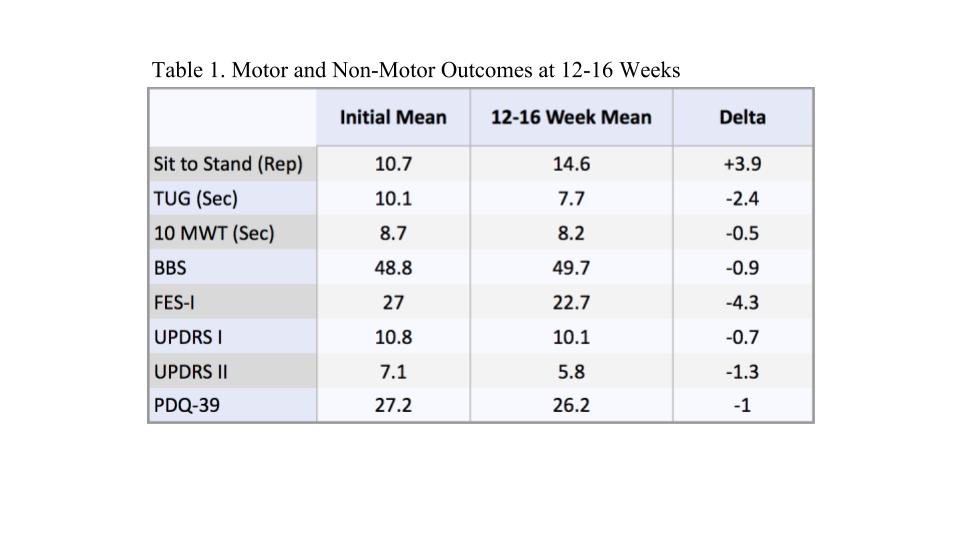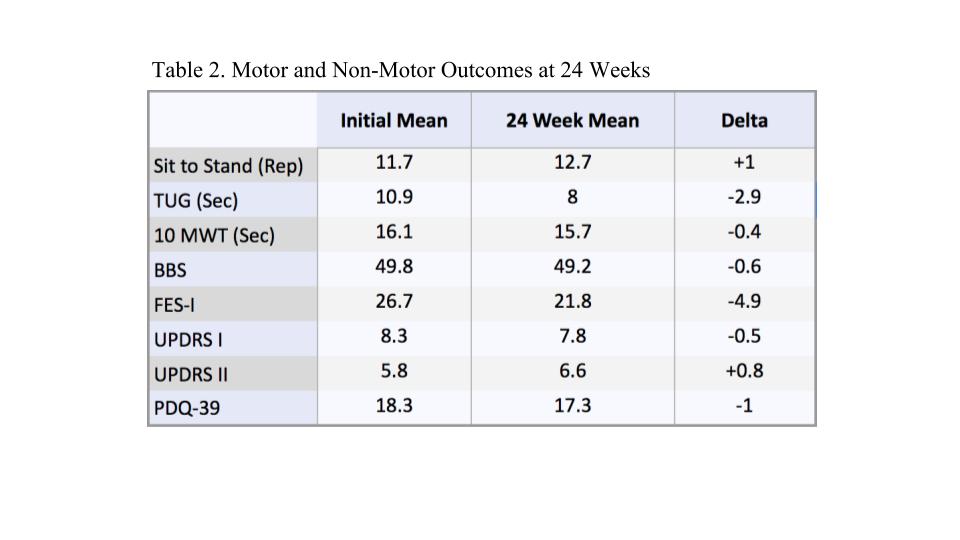Session Information
Date: Saturday, October 6, 2018
Session Title: Parkinson’s Disease: Clinical Trials, Pharmacology And Treatment
Session Time: 1:45pm-3:15pm
Location: Hall 3FG
Objective: To determine the impact of the Rock Steady Boxing (RSB) program on Parkinson’s disease (PD). To assess the feasibility of data collection for activities of daily living (ADLs) and motor symptoms of PD in a real-life setting.
Background: RSB is a non-contact boxing program that was founded in 2006 explicitly for individuals with PD. The 90-minute exercise classes, conducted by specially-trained “RSB coaches,” focus on agility, balance, and speed training. Improvement in balance, gait velocity, and quality of life was previously demonstrated in a case series of 6 RSB participants [Physical Therapy, 2011] and in a RCT involving 17 RSB participants [Neurorehabilitation, 2013].
Methods: New participants enrolling at two different RSB sites in Chicago were selected for the study. Data was collected by RSB coaches prior to participation, and then every 3 months thereafter. Participants completed a PDQ-39, Falls Efficacy Scale (FES) and UPDRS I and II at each assessment. Motor data included RSB coach-tabulated performance on Timed Up and Go (TUG) test, 10 Meter Walk Test (MWT), and Berg Balance Scale (BBS).
Results: Twelve participants, 5 female and 7 male, with mean age of 71 (57 -81), completed assessments at baseline and at 12-14 weeks. Five male participants completed assessments at 24 weeks. Mean change in PDQ-39 was -0.9 at 12 weeks (n=12) and -1.4 at 24 weeks (n=5). Mean change in UPDRS I was -0.7 at 12 weeks and -0.4 at 24 weeks. At 12 weeks there was a mean decrease of 1.3 points on UPDRS II, 4.3 points on FES-I, 2.4 seconds on TUG, 0.5 seconds on 10 MWT, and 0.8 points on BBS [Table 1., Table 2.].
Conclusions: RSB classes were well attended and data collection was feasible in a real-life setting. On average, small improvements were seen in activities of daily living and motor measures assessed. 1. Larson, D., Bega, D., Johnson, E., Slowey, L.; Effects of Rock Steady Boxing on activities of daily living and motor symptoms of Parkinson’s Disease. Poster presented at: 70th Annual Meeting of the American Academy of Neurology; 2018 April 21-27; Los Angeles, CA.
References: 1. Coombs, S.A. et al (2011). Boxing training for patients with Parkinson disease: a case series. Physical Therapy, 91(1): 132-142. 2. Coombs, S.A. et al (2013). Community-based group exercise for persons with Parkinson disease: a randomized controlled trial. NeuroRehabilitation, 2013;32(1):117-24.
To cite this abstract in AMA style:
D. Larson, D. Bega, E. Johnson, L. Slowey. Effects of Rock Steady Boxing on Activities of Daily Living and Motor Symptoms of Parkinson’s Disease [abstract]. Mov Disord. 2018; 33 (suppl 2). https://www.mdsabstracts.org/abstract/effects-of-rock-steady-boxing-on-activities-of-daily-living-and-motor-symptoms-of-parkinsons-disease/. Accessed February 19, 2026.« Back to 2018 International Congress
MDS Abstracts - https://www.mdsabstracts.org/abstract/effects-of-rock-steady-boxing-on-activities-of-daily-living-and-motor-symptoms-of-parkinsons-disease/


